“If You Could Be Any Animal…”
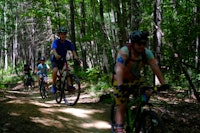
I noticed a bird today. I don’t know what kind it was, but I do remember how it banked and wheeled through the dense interplay of branches in the thick shrubs nearby, threading itself through the keyhole-sized interstices at incredible speed. Perhaps I was still thinking of Steve Longenecker’s Falcons from yesterday.
The bird in mention was spotted in DuPont State Forest, where we were eating a late-afternoon lunch under an open shelter by a pond, contentedly consuming burritos after having already ridden for several hours.

We had begun pedaling by eleven, and even though the sun was already high overhead, the storied canopies of trees kept the heat at bay, preserving the coolness of morning well into noon. At the edge of the forest were plenty of hikers and waders, coming to see the waterfalls or cool off in the river. But as we rode deeper into the trails the woods gave themselves only to us and a few other stray adventurers.
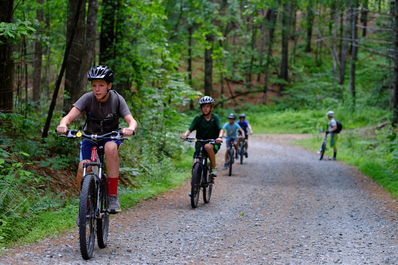
On the bikes, you’re either timing breaths to your pedal strokes, taking every scrap of oxygen you can find, or you’re blazing downhill, too fast and far apart for any species of conversation. It’s a far different atmosphere from the other activities in camp—or from, for instance, the van ride. There are certain well-known landmarks along the roads we take in the area, and throughout the years, the campers and counselors have developed a tradition of shouting out a corresponding drive-by location:
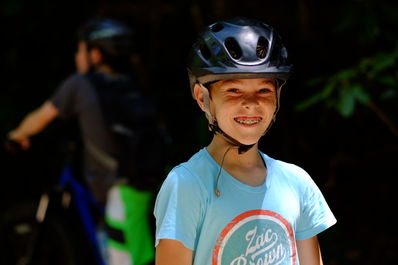
—A street sign labeled Audia Way: “Don’t go outta yer way!” someone shouts.
—Carl Sandburg National Park: Everyone waves and says “Hi, Carl!” in a drawn-out, nasal unison.
—An antiquated and slightly spooky-looking historical mansion: They hum and snap out the first few bars of the Addams Family theme music.
—And my favorite landmark, a small hand-painted sign on the shoulder of the road with the words “DO NOT MOW” written in stern, capital script to deter any county grass-cutters or Samaritan landscapers who might be tempted to tidy the wild flora of the roadside edges. Upon passing this sign, the van erupts in a synchronized chant with the charged inflection of a picket mob: “Eight letters! Three words! One strong message: DO! NOT! MOW!” Laughter follows. In this way, even a logistical necessity like a van ride is made into part of the trip.
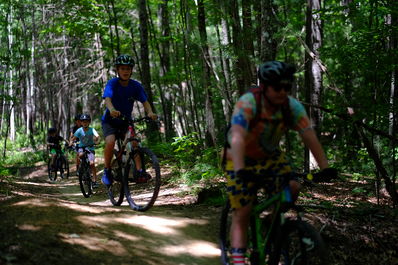
Beyond the van, trips outside of camp have a different tempo. When you hike, or bike, you do so until you’re tired. Then, after you’ve rested and recharged, you travel some more. On the river, you float along with the water, corroborating with eddies and waves until a placid place is found suitable enough for a break. There is no bell. Sometimes, even on just a day-long expedition of speeding bicycles and bodily exertion, that free pace can overlay and coincide with the natural world in which we play. At our picnic shelter, campers began watching the fish in the pond, idly at first but then noticing more. A turtle buoyed to the surface. A fish was guarding a school of minnows from another fish. We even saw a nest of fledgling birds who were probably kin to the aerobatic mother I saw earlier.
Along with that self-sufficient schedule is a need for self-sufficient supply. The counselors don’t have to remind the campers not to play with their water bottles, squirting it into the air as one might do with one of the plumbed fonts in camp. They have to conserve it until the next fill-up. If something breaks, there isn’t another one in a nearby shed. You have to improvise. Stripped-out threads on a pedal? Cut a piece of an old bike tube and shim it into the grooves.
Still, we aren’t completely without a schedule, nor are we completely self-sufficient. There were more trails to ride and daylight wasn’t waiting around forever. With a quick sweep of the picnic area for traces of our respite, we zipped back onto the shaded trails.
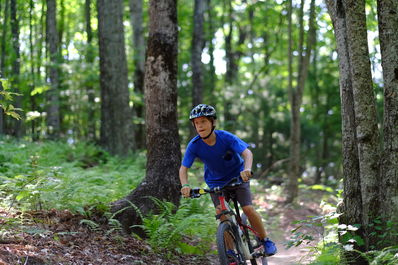
Having completed an impressive circuit from the morning, we began the arduous uphill of our second round. Sometimes that infinitesimal patch of rubber struggling for purchase against rocks, roots and dirt, isn’t enough, which means that a part of mountain biking requires getting off and pushing it up the hill. Some make it farther than others before resorting to pedestrianism, but everyone had to do it at some point. It’s why I always thought of mountains as apt teachers: Each rider can find and meet their own challenge, all at the same time and on the same hillside. That kind of skill-based differentiation is no easy feat in the classroom.
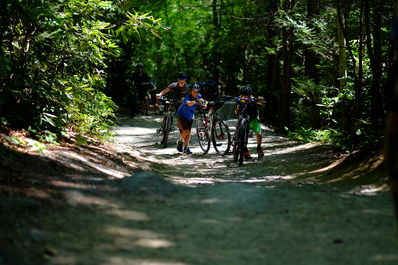
The boys displayed an admirable resilience. There were a few wipe-outs, but nothing that couldn’t be helped by a dusting-off and a straightening of the handlebars. On our last uphill, we had a flat tire. A counselor was fixing it and, as the group waited patiently, the heat of the afternoon impressed a profound stillness on the forest, an impressive quietness rarely found, even at camp. Slowly, a sonorous roll of thunder passed through the sky at such distance and volume that some of us weren’t sure we heard it at all.
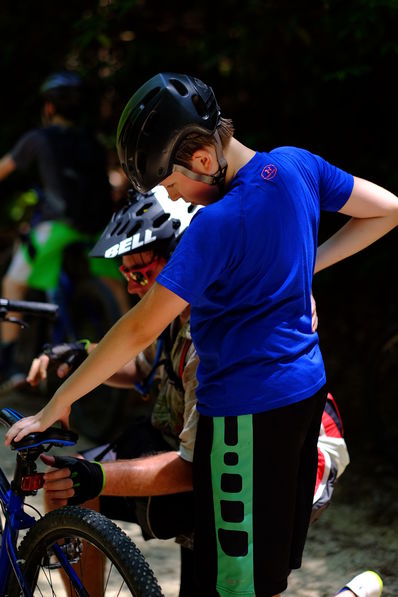
We reached the top, making a few small, winded celebrations. With little else to be said or done, we unceremoniously began our descent of over a mile of downhill trail—it was all that remained between us and the van. What followed was a blur of trees and a narrow ribbon of trail that banked and wheeled between the dense interplay of branches.
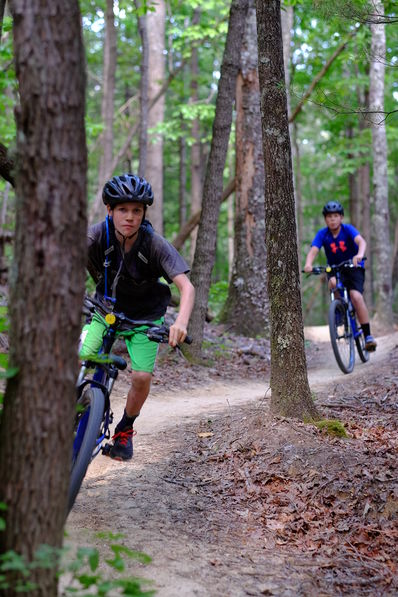
In the parking lot, the sky was beginning to darken. We loaded swiftly.
Underway, I turned from the passenger seat to ask what their favorite part was and they all named the last trail in unison. I asked if all the uphill was worth it and they responded in affirmation. Within minutes, several heads were propped against the windows. Endorphins from exercise fill your brain with a happy sense that bubbles from seemingly nowhere, and that kind of happiness makes a great prelude to a nap.
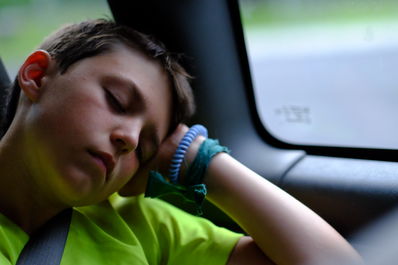
I wish I had asked them something more…perhaps what it is that they like so much about biking and if they’ll keep doing it when they get older. Many boys and girls lose interest in biking when they obtain a driver’s license. Anyway, they’re in bed now, resting up for tomorrow but still I wish I thought of something else to ask them. Perhaps I might have asked them what kind of animal they felt like when they were going down that hill.